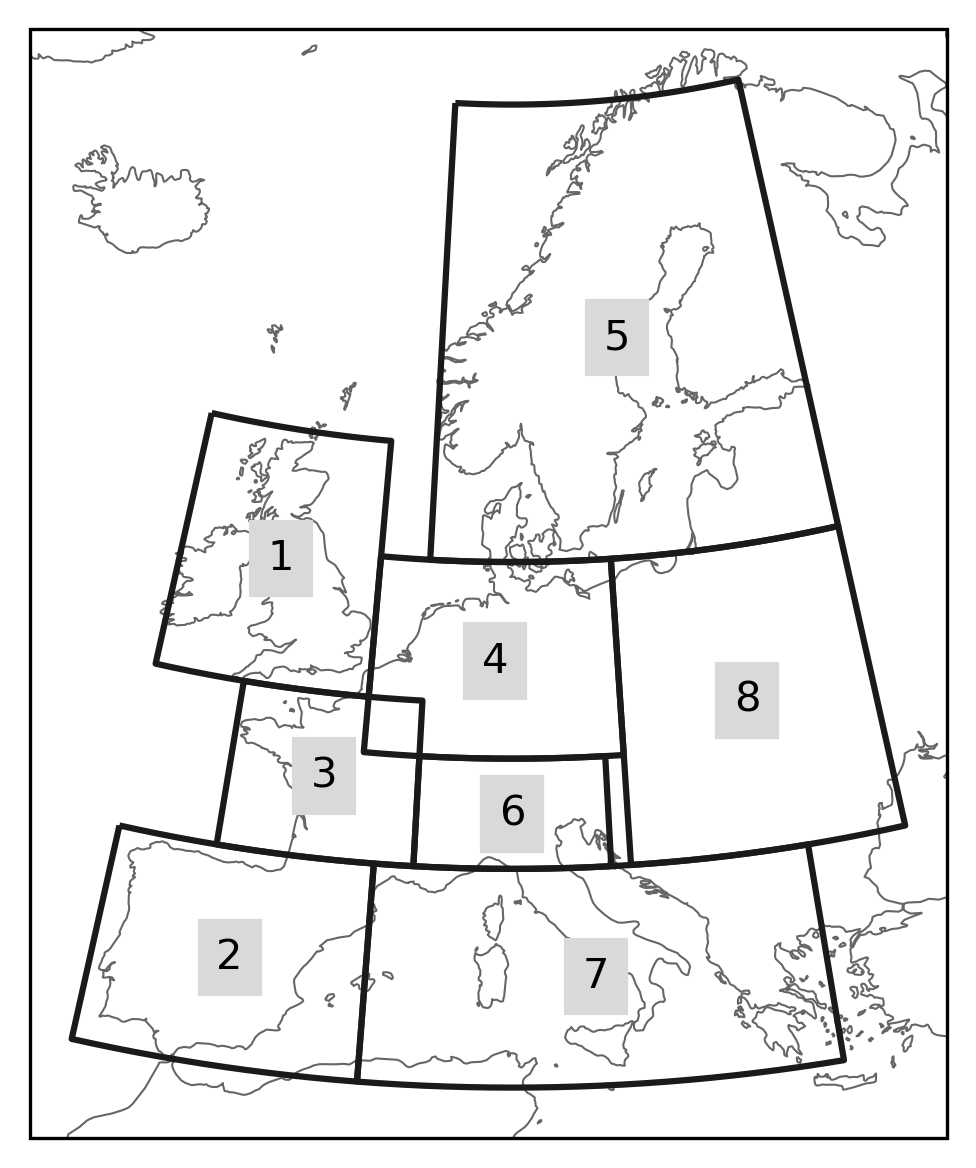Scientific Regions
The following regions, used in the scientific literature, are available in regionmask:
Giorgi Regions (from Giorgi and Franciso, 2000)
SREX Regions (Special Report on Managing the Risks of Extreme Events and Disasters to Advance Climate Change Adaptation (SREX) from Seneviratne et al., 2012)
AR6 Regions (Iturbide et al., 2020; ESSD)
PRUDENCE Regions (from European Regional Climate Modelling PRUDENCE Project, Christensen and Christensen, 2007)
The following imports are necessary for the examples.
In [1]: import regionmask
In [2]: import cartopy.crs as ccrs
Giorgi Regions
The Giorgi reference regions, rectangular regions proposed in Giorgi and Francisco, 2000 were used in the third and fourth assessment reports of the Intergovernmental Panel on Climate Change (IPCC).
In [3]: regionmask.defined_regions.giorgi
Out[3]:
<regionmask.Regions 'Giorgi'>
Source: Giorgi and Franciso, 2000 (http://link.springer.com/article/10.1007...
overlap: False
Regions:
1 AUS Australia
2 AMZ Amazon Basin
3 SSA Southern South America
4 CAM Central America
5 WNA Western North America
.. .. ...
17 EAS East Asia
18 SAS South Asia
19 CAS Central Asia
20 TIB Tibet
21 NAS North Asia
[21 regions]
In [4]: regionmask.defined_regions.giorgi.plot(label='abbrev');
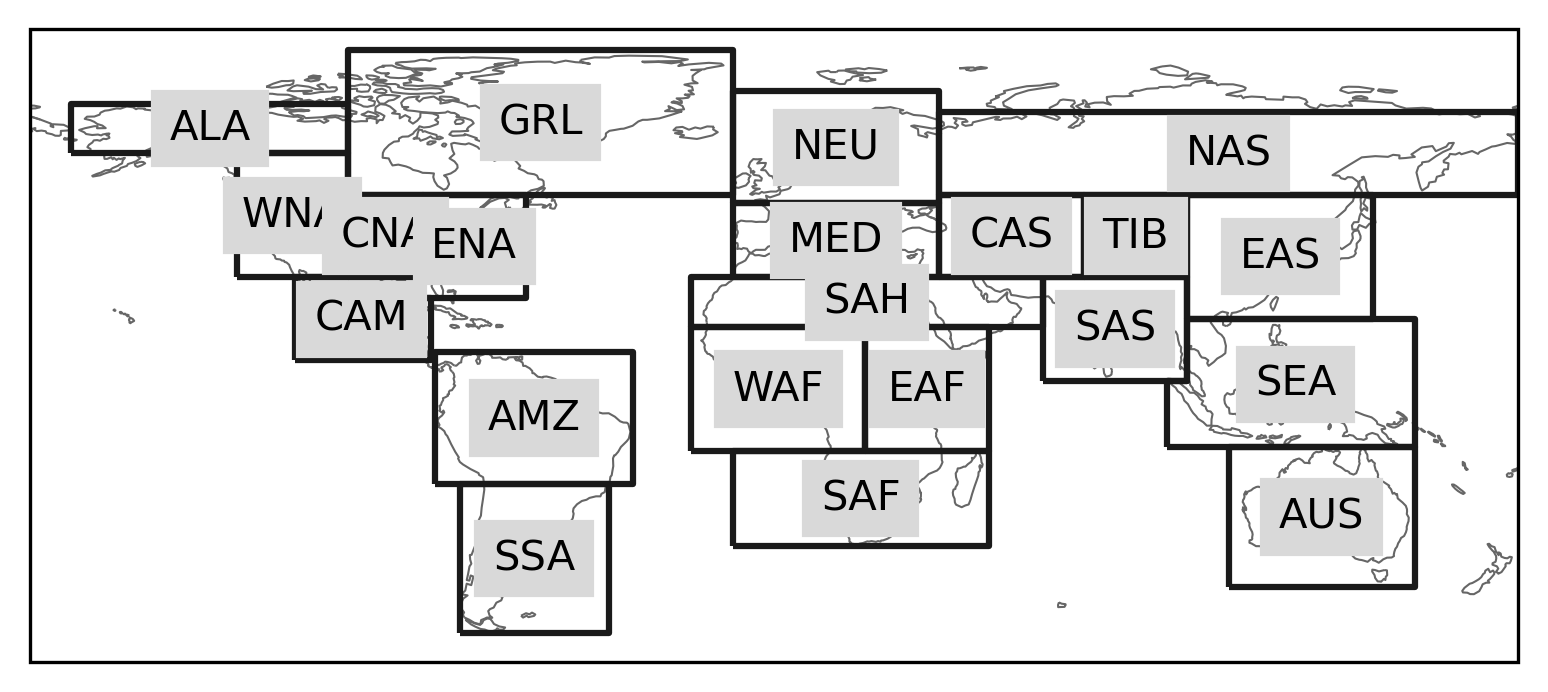
SREX Regions
The Giorgi regions were modified using more flexible polygons in the IPCC Special Report on Managing the Risks of Extreme Events and Disasters to Advance Climate Adaptation (SREX; Seneviratne et al., 2012). A slightly modified and extended version of the SREX regions (not included in regionmask) was used for the fifth IPCC assessment report.
In [5]: regionmask.defined_regions.srex
Out[5]:
<regionmask.Regions 'SREX'>
Source: Seneviratne et al., 2012 (https://www.ipcc.ch/site/assets/uploads/2...
overlap: False
Regions:
1 ALA Alaska/N.W. Canada
2 CGI Canada/Greenl./Icel.
3 WNA W. North America
4 CNA C. North America
5 ENA E. North America
.. .. ...
22 EAS E. Asia
23 SAS S. Asia
24 SEA S.E. Asia
25 NAU N. Australia
26 SAU S. Australia/New Zealand
[26 regions]
In [6]: regionmask.defined_regions.srex.plot();
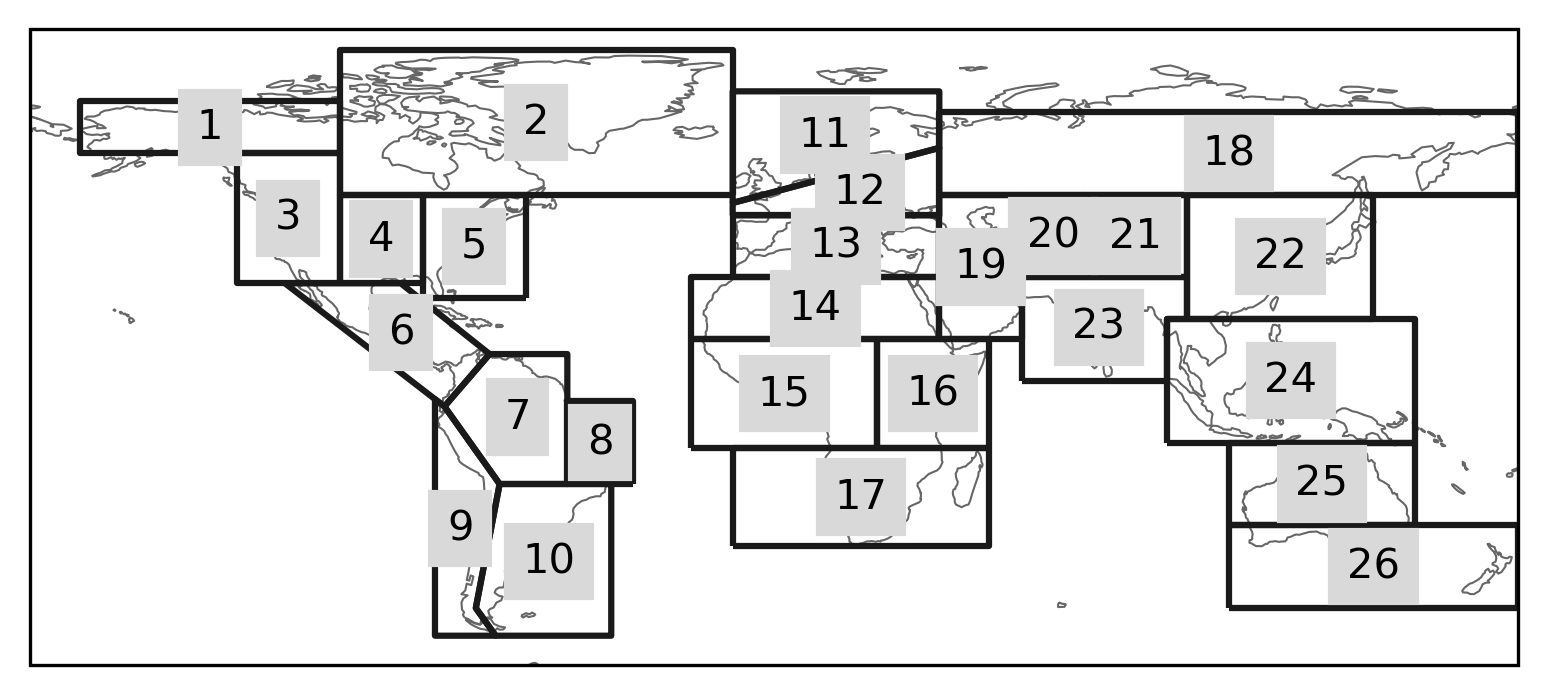
AR6 Regions
The sixth IPCC assessment report (AR6) again updated the SREX regions in Iturbide et al.,
(2020), which defines 58 regions. The regions cover the land and ocean (ar6.all).
In addition the regions are also divided into land (ar6.land) and ocean
(ar6.ocean) categories. The numbering is kept consistent between the categories.
Note that some regions are in the land and in the ocean categories (e.g. the Mediterranean).
All
In [7]: regionmask.defined_regions.ar6.all
Out[7]:
<regionmask.Regions 'AR6 reference regions'>
Source: Iturbide et al., 2020 (ESSD)
overlap: False
Regions:
0 GIC Greenland/Iceland
1 NWN N.W.North-America
2 NEN N.E.North-America
3 WNA W.North-America
4 CNA C.North-America
.. .. ...
53 ARS Arabian-Sea
54 BOB Bay-of-Bengal
55 EIO Equatorial.Indic-Ocean
56 SIO S.Indic-Ocean
57 SOO Southern-Ocean
[58 regions]
In [8]: text_kws = dict(color="#67000d", fontsize=7, bbox=dict(pad=0.2, color="w"))
In [9]: regionmask.defined_regions.ar6.all.plot(
...: text_kws=text_kws, label_multipolygon="all"
...: );
...:
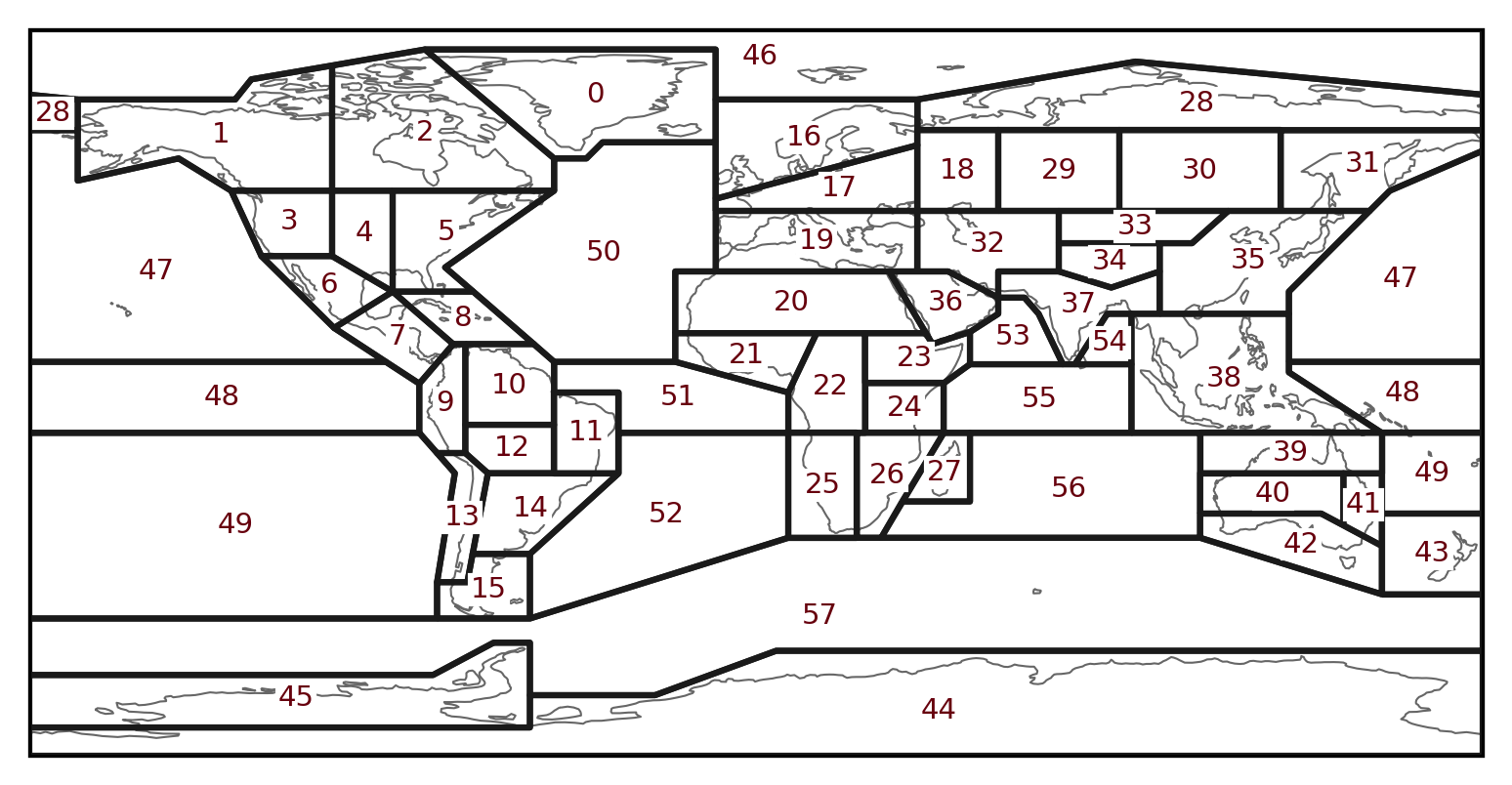
Land
In [10]: regionmask.defined_regions.ar6.land
Out[10]:
<regionmask.Regions 'AR6 reference regions (land only)'>
Source: Iturbide et al., 2020 (ESSD)
overlap: False
Regions:
0 GIC Greenland/Iceland
1 NWN N.W.North-America
2 NEN N.E.North-America
3 WNA W.North-America
4 CNA C.North-America
.. .. ...
41 EAU E.Australia
42 SAU S.Australia
43 NZ New-Zealand
44 EAN E.Antarctica
45 WAN W.Antarctica
[46 regions]
In [11]: regionmask.defined_regions.ar6.land.plot(text_kws=text_kws, add_ocean=True);
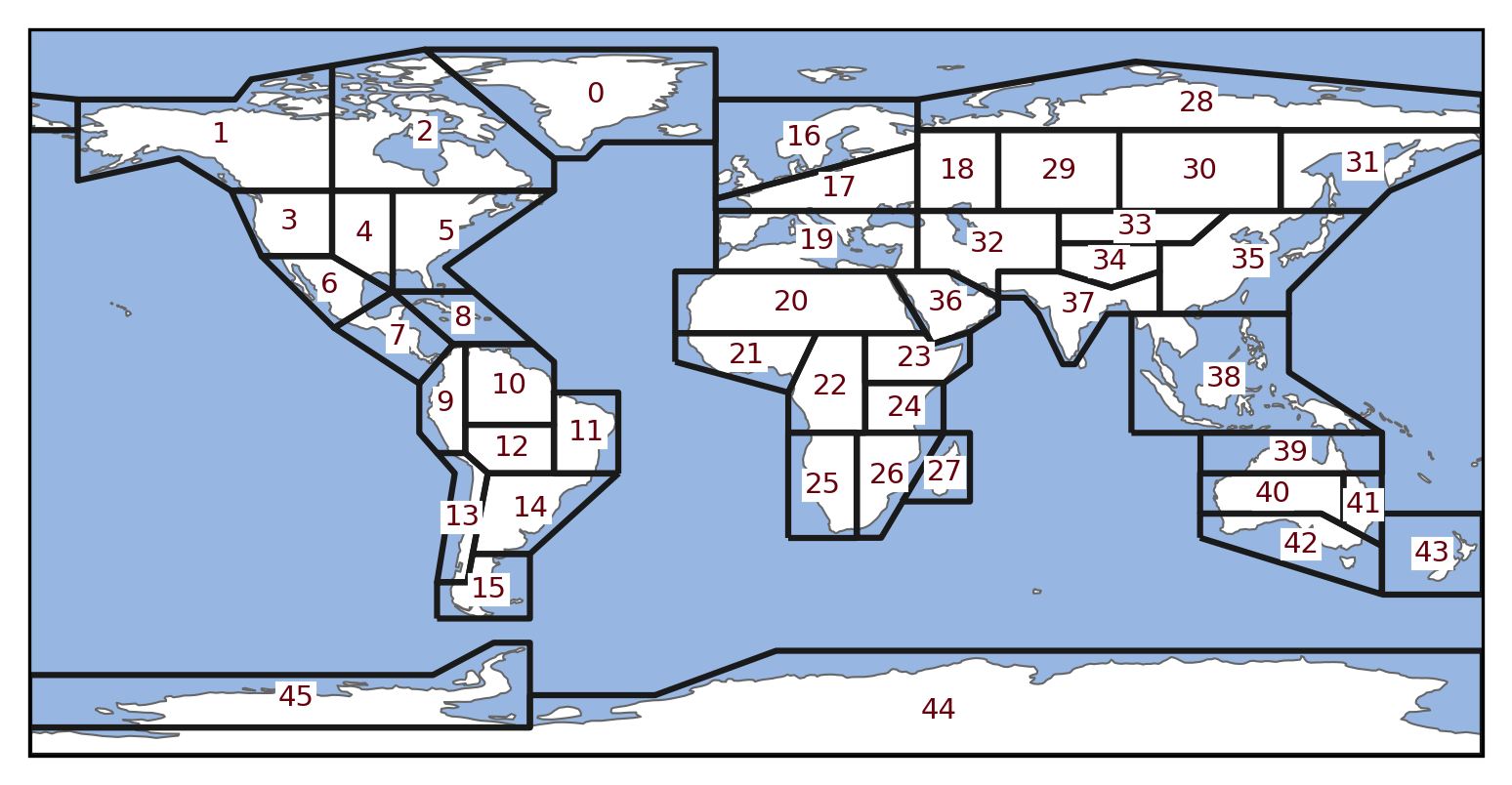
Ocean
In [12]: regionmask.defined_regions.ar6.ocean
Out[12]:
<regionmask.Regions 'AR6 reference regions (ocean only)'>
Source: Iturbide et al., 2020 (ESSD)
overlap: False
Regions:
8 CAR Caribbean
19 MED Mediterranean
38 SEA S.E.Asia
46 ARO Arctic-Ocean
47 NPO N.Pacific-Ocean
.. .. ...
53 ARS Arabian-Sea
54 BOB Bay-of-Bengal
55 EIO Equatorial.Indic-Ocean
56 SIO S.Indic-Ocean
57 SOO Southern-Ocean
[15 regions]
In [13]: regionmask.defined_regions.ar6.ocean.plot(
....: text_kws=text_kws, add_land=True, label_multipolygon="all"
....: )
....:
Out[13]: <GeoAxes: >
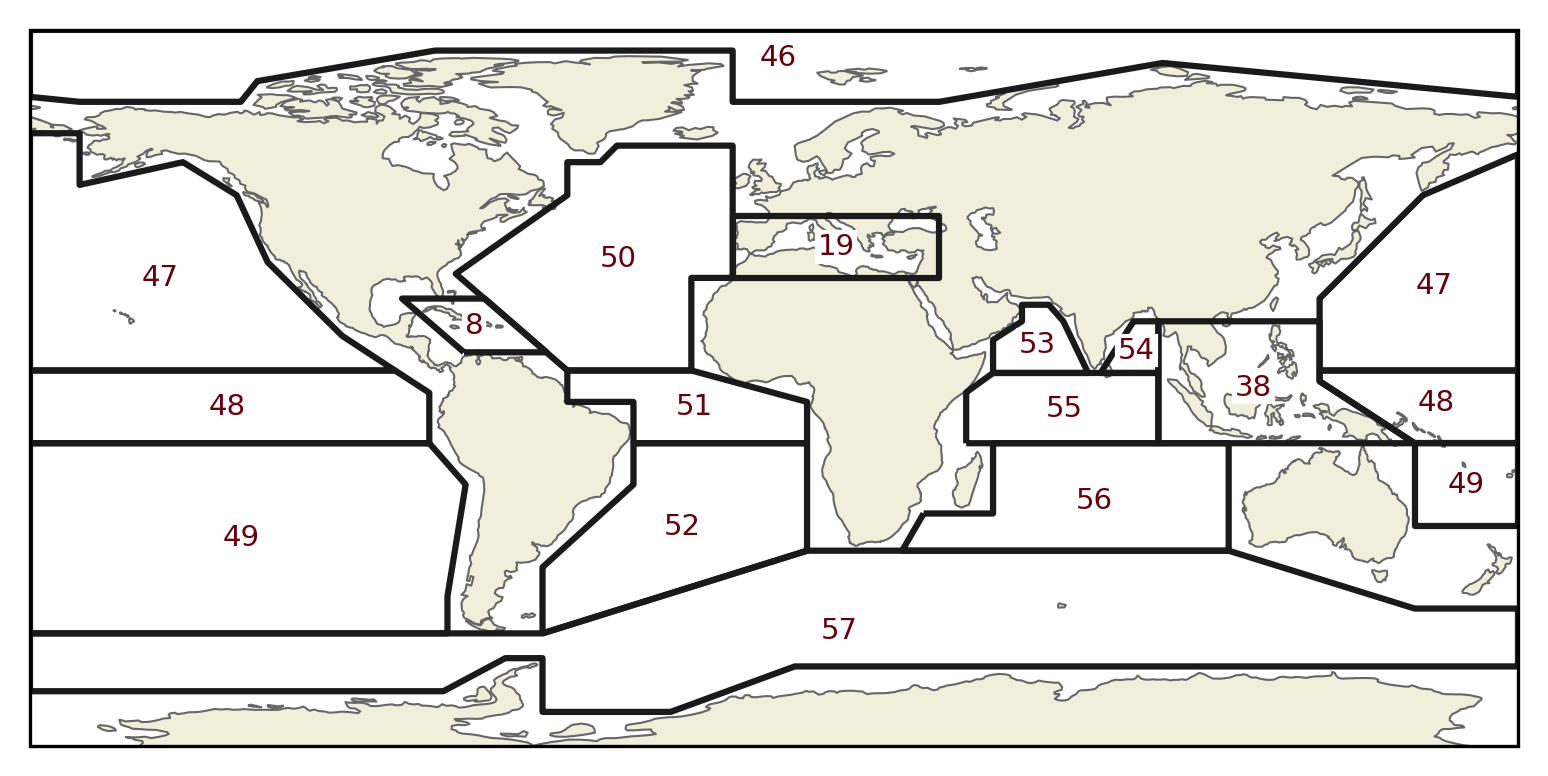
PRUDENCE Regions
The PRUDENCE regions were defined in the PRUDENCE project as European sub-areas for regional climate model output and are often used in European climate studies. They contain 8 regions, Alps (AL), British Isles (BI), Eastern Europe (EA), France (FR), Iberian Peninsula (IP), Mediterranean (MD), Mid-Europe (ME), and Scandinavia (SC).
Warning
The region FR and ME overlap, hence it is not possible to create 2D masks use prudence.mask_3D(lon, lat).
In [14]: regionmask.defined_regions.prudence
Out[14]:
<regionmask.Regions 'PRUDENCE'>
Source: Christensen and Christensen, 2007, Climatic Change 81:7-30 (https:/...
overlap: True
Regions:
1 BI British Isles
2 IP Iberian Peninsula
3 FR France
4 ME Mid-Europe
5 SC Scandinavia
6 AL Alps
7 MD Mediterranean
8 EA Eastern Europe
[8 regions]
# choose a good projection for regional maps
In [15]: proj = ccrs.LambertConformal(central_longitude=10)
In [16]: regionmask.defined_regions.prudence.plot(projection=proj, resolution="50m");
